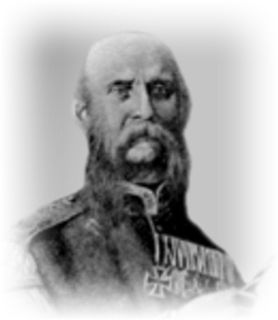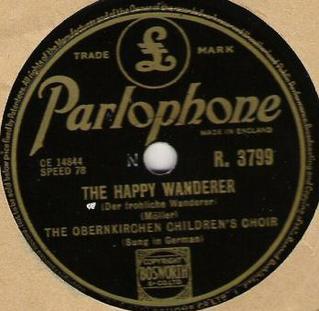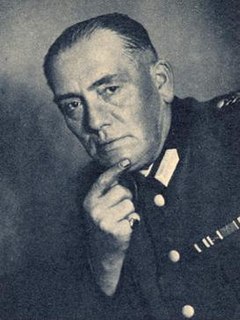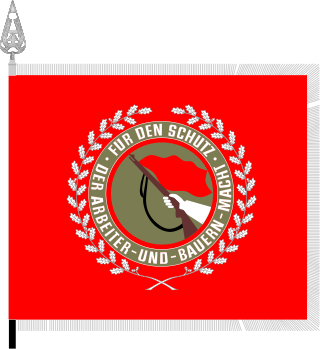
Johann Gottfried Piefke was a German band leader, (Kapellmeister) and composer of military music.

"The Internationale" is a left-wing anthem. It has been a standard of the socialist movement since the late nineteenth century, when the Second International adopted it as its official anthem. The title arises from the "First International", an alliance of workers which held a congress in 1864. The author of the anthem's lyrics, Eugène Pottier, an anarchist, attended this congress.
Articles related to East Germany include:

The National People's Army was the armed forces of the German Democratic Republic (GDR) from 1956 to 1990.
Nazi songs were songs and marches created by the NSDAP. In modern Germany, the public singing or performing of songs exclusively associated with the NSDAP is now illegal.
KDA or similar may refer to:

"The Happy Wanderer" is a popular song. The original text was written by Florenz Friedrich Sigismund (1788-1857). The present tune was composed by Friedrich-Wilhelm Möller shortly after World War II. The work is often mistaken for a German folk song, but it is actually an original composition. His sister Edith Möller conducted a small amateur children's and youth choir in Schaumburg County, Northern Germany, internationally named Obernkirchen Children's Choir, in Germany named Schaumburger Märchensänger. She adapted Sigismund's words for her choir.

In military history, the German term Kampfgruppe can refer to a combat formation of any kind, but most usually to that employed by the Wehrmacht of Nazi Germany and its allies during World War II and, to a lesser extent, of the German Empire in World War I.
The "Badonviller-Marsch" is a Bavarian military march by composer Georg Fürst (1870–1936). After 1934, with its name Germanized to "Badenweiler Marsch" by the Nazis, it was used as the official march of Hitler in his role as Führer, to signal his arrival and therefore personal presence at public events.
Kampfgruppe is the concept of a flexible combat formation.

The March to the Drina is a Serbian patriotic march which was composed by Stanislav Binički during World War I. Binički dedicated it to his favourite commander in the Serbian Army, Col. Milivoje Stojanović, who had fought during the Battle of Cer, but was killed later in the Battle of Kolubara. The song experienced widespread popularity during and after the war and came to be seen by Serbs as a symbol of resistance to the Great Powers. Following World War II, it was popular in Socialist Yugoslavia where a single release in 1964 achieved Gold Record status. The march was played at the presentation ceremony for the Nobel Prize in Literature when Yugoslav writer Ivo Andrić was named a Nobel laureate in 1961.

"Until the Night" is a song written by Billy Joel for his 1978 album, 52nd Street. The song, which Joel has confirmed was inspired by the Righteous Brothers, is an example of Joel's penchant for evoking the hit sounds of the 1960s which would be the basis for his 1983 album, An Innocent Man.
"Der Hohenfriedberger", also called "Hohenfriedberger Marsch" or "Der Hohenfriedberger Marsch", is one of the most classic and well known German military marches. It takes its name from the victory of the Prussians over the allied Austrians and Saxons on June 4, 1745 during the Second Silesian War at the Battle of Hohenfriedberg, near Striegau.

The Königgrätzer Marsch, also known as Der Königgrätzer or Der Königgrätzer Marsch, is one of the most famous German military marches, composed in 1866 by Johann Gottfried Piefke in commemoration of the Battle of Königgrätz, the decisive battle of the Austro-Prussian War, in which the Kingdom of Prussia defeated the Austrian Empire. In Piefke's most successful arrangement of the Königgrätzer Marsch, another march, Der Hohenfriedberger, is used as a trio. The commonly played version is set as an infantry march, while an alternate adaptation is arranged as a cavalry galop. The German military march catalogue also has the "Königgrätzer mit anderem Trio", but this secondary composition is far less recognized.
Es war ein Edelweiss is a march, with music and lyrics composed by Herms Niel in 1941 for the German Army.
The Armeemarschsammlung, also known as the Prussian Army March Collection refers to the basic catalog of works of German military march music.

Ferdinand Friedrich Hermann Nielebock, known as Herms Niel, was a German composer of military songs and marches.
Hans Felix Husadel was a German composer and conductor, particularly noted for modernizing the military band and for his march compositions.
Hans-Gerhart Schmierer is a German politician and author.











